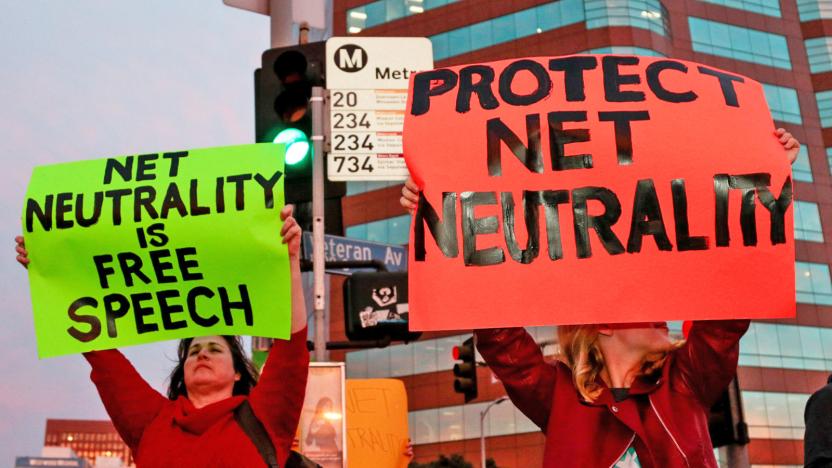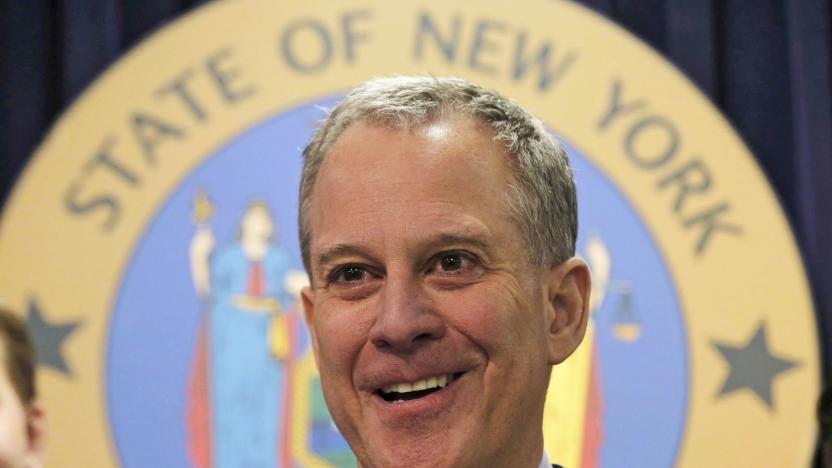comments
Latest

Gab browser extension puts a far-right comments section on every site
Gab, the "free speech" social network that's become a haven for the far-right, has launched a browser extension that creates an alternative comments section for any website. The "Dissenter" plug-in -- which appears as a sidebar once enabled -- allows Gab users to discuss everything from tweets to Wikipedia pages in real-time without the fear of said comment being removed by a site's moderators.

YouTube shuts down comments on videos with young kids
YouTube is taking far-reaching actions to prevent a repeat of the pedophilic comments that plagued videos on the service. It has disabled comments on "tens of millions" of clips with young children in them over the past week, and plans a "broadening" of this action in the months ahead for both videos with young kids as well as those with older kids that "could be at risk of attracting predatory behavior."

YouTube axes hundreds of channels over child exploitation concerns
YouTube has removed more than 400 channels and disabled comments on "tens of millions of videos" over the last few days after reports suggested a child porn ring was persisting on the platform. In a comment on a video published by Philip DeFranco Wednesday, the service's creator relations team said YouTube's staff are working "incredibly hard to root out horrible behavior," and have "reported illegal comments to law enforcement."

Justice Department investigates fake net neutrality comments
The scrutiny over fake net neutrality comments appears to be intensifying. Sources talking to BuzzFeed News said the Justice Department is investigating whether or not there were crimes when people posted millions of bogus comments on the FCC's net neutrality repeal, stealing many people's identities in the process. The FBI reportedly subpoenaed at least two organizations for information "a few days" after New York state did for its own investigation, according to the insiders.

Google may add public comments for searches
Google+ is shutting down in the wake of a data privacy flaw, but that doesn't mean Google is now uninterested in social features. The 9to5Google crew has discovered what appears to be in-testing support for comments on search results. The feature would be limited to live sports matches (at least at first), but it would separate feedback from both pro commentators and viewers and would include filters to highlight the top comments. And yes, there would be moderation to cut down on spam and other abuse.

New study dissects FCC net neutrality commenter backgrounds
A new study out of Stanford University has found that while nearly every unique comment filed in response to the FCC's proposal to repeal net neutrality opposed the agency's plan, net neutrality support was geographically widespread and spanned party lines. The FCC's comment system has attracted quite a bit of criticism, with many reports detailing how massive amounts of fake comments were included among legitimate ones. Because of this, the study notes, it's unclear what people really said to the FCC through its comment system.

NYT lawsuit accuses FCC of withholding evidence of Russian meddling
Are you frustrated that the FCC has been reluctant to cooperate with investigations into fake anti-net neutrality comments? So is the New York Times. The newspaper has sued the FCC after the regulator repeatedly refused to provide server logs for its public comment system under the Freedom of Information Act, even after the NYT reduced the scale of its requests. Journalists believe the records will "shed light" on the degree to which Russians interfered with both the commenting process and American democracy at large.

Why are people pretending to be dead on Instagram?
Ahmed Simrin, 15, is one of the millions of teenagers who uses Instagram. He doesn't post pictures on his page every day (there are two total), yet somehow he's managed to get nearly 3,000 people to follow it. That doesn't make him a social media influencer, by any means, but his Instagram page quickly stands out when you realize one of the photos has over 22,000 comments and 4,000 likes. This type of engagement is typically only seen on accounts from celebrities. His viral picture, posted in October 2017, isn't anything out of the ordinary, either: It's Simrin simply standing next to his friend, each staring directly into the camera, with a caption that reads "Fresh out the oven." But then you look at the comments, and it would appear that poor Simrin is no longer with us. There are thousands of users telling him to rest in peace. "RIP, you'll be missed." "RIP, bro." "You died way too young." "I can't believe you're gone." The list goes on and on.

FCC received thousands of fake letters supporting NFL's blackout rule
Fake FCC comments aren't just reserved for net neutrality opponents. The Wall Street Journal has discovered that the FCC received about 21,000 identical letters urging the regulator to let the NFL keep its blackout rule, which let it ban cable and satellite airings of home games that weren't sold out when the league blocked local broadcasts. These weren't even subtle attempts, either. In addition to using the identities and email addresses of some people without their consent, the campaign relied on some obviously fake messages -- at last check, Bilbo Baggins was more interested in magic rings than cheering on American football teams.

ESPN axes its not-so-helpful comment sections
Add ESPN to the list of major websites that are less than thrilled with reader discussions. The sports broadcaster has confirmed to Deadspin that it has dropped its Facebook-linked comment sections across its websites, with no plans to bring them back or archive the results. There are "more touchpoints than ever" for fans to share their opinions, a spokesperson said, and ESPN is creating social media material that "embraces these conversations." Not that many readers will necessarily mind.

Facebook's 'downvote' test spreads to more users Down Under
With Facebook's F8 developer event approaching, word has spread that more users can try its "downvote" button on post comments. While it's not the fabled "dislike" button that some would like to see, it is a way for users to flag comments Reddit-style on public posts. That may come in handy as it rolls out more video, VR and whatever else' we'll hear about during its 1 PM ET keynote. Facebook confirmed to CNET that its test is occurring in New Zealand, but many users in Australia report seeing the buttons too.

Representatives ask GAO to investigate FCC net neutrality comments
It's not just senators calling for a review of the FCC's millions of fake anti-net neutrality comments. Representatives Elijah Cummings, Greg Meeks and Frank Pallone have sent a letter to the Government Accountability Office asking it to investigate the comments. They want to know the extent of the fakery, which would violate laws barring fraudulent representation in any subject under the executive branch's oversight. And crucially, they also want a look at the FCC's response -- they're "concerned" that it stonewalled New York's investigation by withholding information (at least, until very recently).

FCC will help New York investigate fake net neutrality comments
To say the FCC has been reluctant to look into the millions of fake comments supporting its decision to kill net neutrality would be an understatement. The Commission did nothing to tackle the issue for months, and repeatedly stonewalled New York state's investigation. At last, though, there might be some progress. New York Attorney General Eric Schneiderman has revealed that the FCC Inspector General's office has "reversed course" and intends to cooperate with the state's inquiry. Just what that cooperation entails isn't clear, but it beats the virtual silence until now.

Over half of FCC net neutrality comments may be fake, study says
The FCC's proposal to roll back net neutrality protections was up for public comment between April 27th and August 30th and while nearly 22 million comments were submitted, there's been a bit of discussion surrounding who or what registered those comments and how accurately they reflect the public opinion of the plan. The Pew Research Center looked into those millions of comments and it published its findings today. Overall, the center found that very few comments were unique, more than half came from temporary or duplicate email addresses and on multiple occasions, tens of thousands of comments were filed at the exact same time, suggesting use of bot campaigns.

Facebook ends experiment debunking fake news with comments
It's increasingly clear that some of Facebook's methods for downplaying fake news are more effective than others. The social site has ended an experiment where it tried prioritizing comments that accused stories of being fake, theoretically challenging fake news and other sketchy articles. A Facebook spokesperson talking to the BBC didn't explain the exact reasons behind discontinuing the trial (it's described as a "small test which has now concluded"). However, some of the publicly available examples suggest that it was just too indiscriminate.

Disqus reveals it suffered a security breach in 2012
Another day, another security breach (and another, and another...). This time it's Disqus, which is revealing that in 2012 -- around the time when Engadget used Disqus for comments -- hackers made off with some of its data, covering a snapshot of usernames and associated email addresses dating back to 2007, as well as "sign-up dates, and last login dates in plain text for 17.5mm [sic] users." More distressing is news that it also coughed up passwords for a third of those accounts, which were in hashed (SHA1) form but it's possible the attackers could have decrypted them.

Instagram moves beyond its all-or-nothing approach to comments
Instagram already has tools to filter your comments, but sometimes that's just not enough. What if you're tired of comment spam, or just don't like that creep who tries to flirt with you on every post? You can finally do something about it outside of reporting individual users. Instagram is rolling out comment tools that give you tight control over who can leave feedback on your photos and videos. So long as your account is public, you can set broad controls (such as limiting comments to people you follow). And even if your account is private, you can block specific users.

Google’s comment-ranking system will be a hit with the alt-right
A recent, sprawling Wired feature outlined the results of its analysis on toxicity in online commenters across the United States. Unsurprisingly, it was like catnip for everyone who's ever heard the phrase "don't read the comments." According to "The Great Tech Panic: Trolls Across America," Vermont has the most toxic online commenters, whereas Sharpsburg, Georgia, "is the least-toxic city in the US." There's just one problem.

China orders internet comments linked to real identities
China isn't slowing down in its bid to silence online political opposition. As of October 1st, the country will require that tech firms hold on to records of the real identities of everyone posting comments on internet message boards. This is to discourage "false rumors, filthy language and illegal messages," according to the government. Of course, it's that last part that Chinese officials are really interested in -- they know you're less likely to challenge the political order if investigators can easily track you down.

Instagram tidies up comment sections with threaded responses
Instagram doesn't care if you see all your friends' posts in chronological order. But it does want you interacting with the month-old photos its algorithm picks to appear above and below more recent posts. The latest example is a change to how commenting on posts works. Instead of responses all getting grouped together, replying to a comment will automatically create a thread. Handy! It's a minor tweak, sure, but one that somehow wasn't present until now. Maybe an opt-in button for the algorithm-driven timeline will be next. Wait, why are you laughing?







